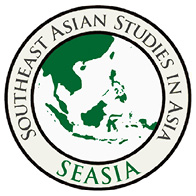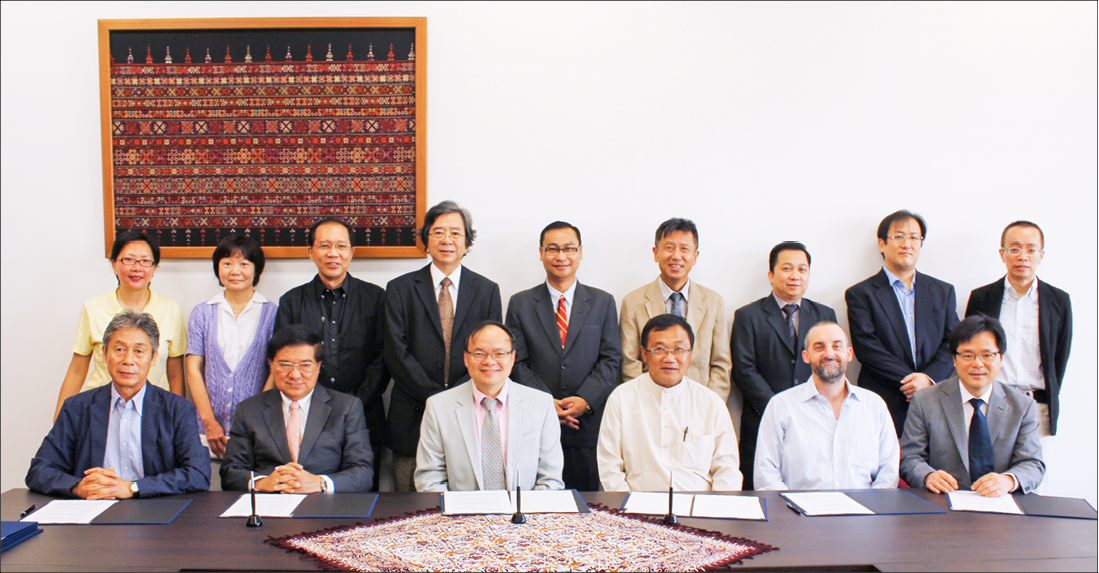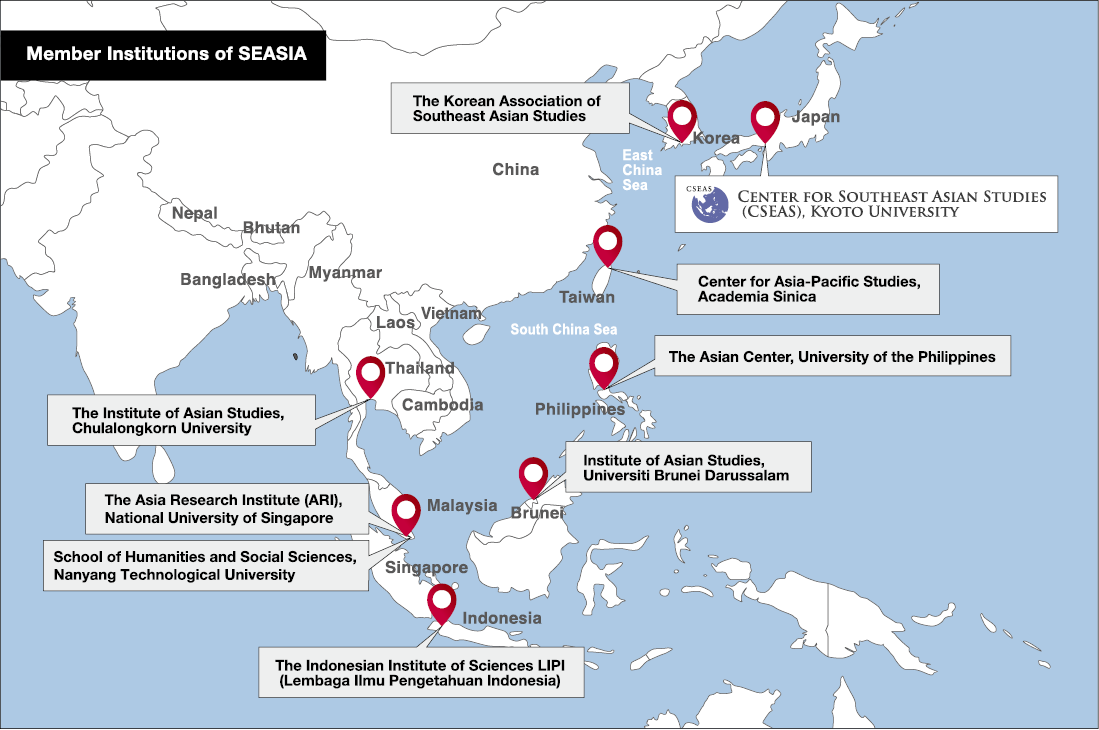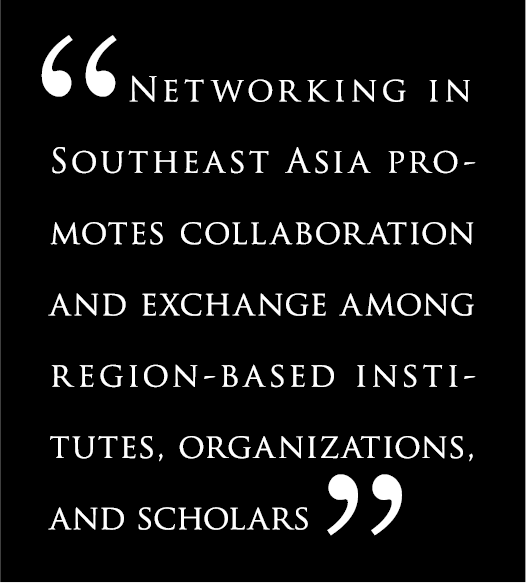
Consortium for Southeast Asian Studies in Asia (SEASIA)
Over the past few decades, in tandem with ever-deepening economic integration, increasing cross-border flows and movements of people, goods, ideas, and technologies, a number of leading organizations, communities, and individuals in East Asia (Northeast and Southeast Asia) have been initiating, cementing, and institutionalizing both regional and global linkages and collaborations at the governmental and non-governmental levels, particularly in business, academia, and the arts.
It goes without saying that network-style academic cooperation has become de rigueur among area specialists as well. But over the years, academic cooperation in the East Asia region has mainly taken the form of bundles of bilateral (or at most trilateral) exchanges and collaboration, involving great expenditure of time, energy, and funds. There are many overlaps in the thematic focus of conferences, symposia and workshops sponsored individually or jointly by area studies institutions. Some of the unintended consequences of this “noodle-bowl” phenomenon include intellectual fragmentation and segmentation even within one particular topic of “area studies” as can be experienced at some of the larger academic meetings that are frequently held. This fragmentation and segmentation can potentially impede the development of synergistic, inter- and multi-disciplinary research and ultimately hinder comparative approaches to area studies -goals and endeavors that are held and pursued in common by all of us scholars who are keen to promote area studies.
Since the Lehman shock economic crisis of 2008, the ongoing cuts to education budgets, especially in the humanities and social sciences in both Europe and the U.S., have made it difficult for those traditional institutions that have represented and fostered Southeast Asian Studies outside of the region to continue the same level of research that has sustained scholarship. As such, in light of ongoing funding uncertainties in an era of biting budget cuts, it makes more sense for area studies institutions to pool researchers, networks and funds, and collaborate together.
ASEAN and Networking within Southeast Asia
The study of Southeast Asia has been an integral part of Asian studies, and is represented in various international academic meetings such as the Association for Asian Studies (AAS), International Convention of Asia Scholars (ICAS), and European Association for South East Asian Studies (EuroSEAS). In parallel to these meetings which have until very recently been held outside of the region, there have also existed region-based in stitutions that have provided excellent platforms for promoting Southeast Asian studies. The creation and rise of East Asian and Southeast Asian Studies departments and research institutes within the region and in its vicinity is testimony to this. As ASEAN comes of age through the creation of a regional community in 2015, there is now a more compelling need to establish a region-based consortium of Southeast Asian Studies institutions, one that can complement deepening economic, social and cultural integration and foster both regional and global efforts to network. A consortium would enable scholars who live and research within or close to the region to come together without the added expense of traveling outside of it.

Top, from left: Caroline Sy Hau, Hayami Yoko, Eduardo Tadem, Hsin-Huang Michael Hsiao, Yabit bin Alas, Kono Yasuyuki, Noor Azam, Mieno Fumiharu, Jafar Suryomenggolo Bottom, from left: Shimizu Hiromu, Sunait Chutintaranond, Liu Hong, Tong Chee Kiong, Micheal Feener, Park Jang Sik
Such a consortium, forged out of the networks already in place within the region, can ultimately promote collaboration and exchange among Southeast Asia and other East Asia-based institutes, organizations and scholars. More importantly, it can endeavor to connect institutions that specialize in the natural sciences, social sciences, and humanities, which are ready to engage in the task of multi-disciplinary analyses of issues that affect societies within the region. It can bring together specialists in earthquake science and disaster management, medical research, urban studies, ecology, energy, resource management, epidemiology and pandemics, economic and creative industries. In effect, it can foster communication between scholars who have an interest in, and who work on or in Southeast Asia, but who do not necessarily consider themselves area studies specialists.

Whereas in other places, Southeast Asian studies constitutes only one sub-regional branch of “area studies” among many other areas, and is subject to the vicissitudes of funding and institutional imperatives specific to the countries in which they are based, for scholars working on Southeast Asia who are based in East/Southeast Asia, this “area” matters in geopolitical, economic, intellectual, institutional, social, cultural, and affective terms. The study of Southeast Asia is not peripheral and external to what scholars, public intellectuals, policy-makers, and activists are doing in the region.
Building on the imperative to promote region-based Southeast Asian studies, the Center for Southeast Asian Studies (CSEAS) at Kyoto University, in partnership with nine leading Asian and Southeast Asian Studies institutions in the region, established a Consortium for Southeast Asian Studies in Asia (SEASIA) on 11 October 2013, to put in place a network that can realize the above aims.

The following institutions are the founding members of this consortium.
- • Academia Sinica; the Institute of Asian Studies, Chulalongkorn University
- • The Indonesian Institute of Sciences
- • The Korean Association of Southeast Asian Studies
- • The Center for Southeast Asian Studies, Kyoto University
- • The Asia Research Institute, National University of Singapore
- • The School of Humanities and Social Sciences, Nanyang Technological University
- • The Taiwan Association of Southeast Asian Studies
- • The Institute of Asian Studies, Universiti Brunei Darussalam
- • The Asian Center, University of the Philippines.
Professor Sunait Chutintaranond of Chulalongkorn University is Chairperson of the Governing Board and the Governing Board has the following members:
- • Ikrar Nusa Bhakti (Indonesian Institute of Sciences)
- • Eduardo Tadem (University of the Philippines)
- • Michael Feener (National University of Singapore)
- • Liu Hong (Nanyang Technological University)
- • Tong Chee Kiong (Universiti Brunei Darussalam)
- • Hsin-Huang Michael Hsiao (Academia Sinica)
- • Park Jang Sik (Korean Association of Southeast Asian Studies)
The Secretariat is based in the Center for Southeast Asian Studies at Kyoto University.
- • Shimizu Hiromu (Kyoto University) Secretary
SEASIA will promote Southeast Asian studies by linking the leading area studies institutions in the region in a cooperative venture to provide a multilateral forum for organizing academic meetings, seminars, workshops, and symposia. The main activity will be to organize a biennial conference, the first of which is expected to take place in Kyoto in 2015.
SEASIA will also promote research collaboration and networking, operate as a system for sharing information and offer opportunities for education and training of young and up-and-coming scholars. It will deepen connections between institutions specializing in the natural sciences, social sciences and humanities whose scholars have an interest in, and who work on or in Southeast Asia, but do not necessarily consider themselves area studies specialists. Although its focus is on promoting Southeast Asian studies, it actively welcomes and seeks to promote comparative, trans-disciplinary, global, and historical approaches that consider Southeast Asia in relation to other regions and to the world. The Consortium will also provide a platform not only for collaboration and exchange, but for information and resource-sharing, joint publications and the education and training of young researchers.
Although in the initial stages, this consortium within the region will ultimately be open to all those institutions outside of it which been committed to, and fostered study within the region over the years. We hope that by encouraging scholars from different regions of the world to participate in this endeavor, we can encourage a more comparative, holistic and collaborative approach to enriching our knowledge of Southeast Asia and promote it both from within and outside.
Consortium for Southeast Asian Studies in Asia (SEASIA)
